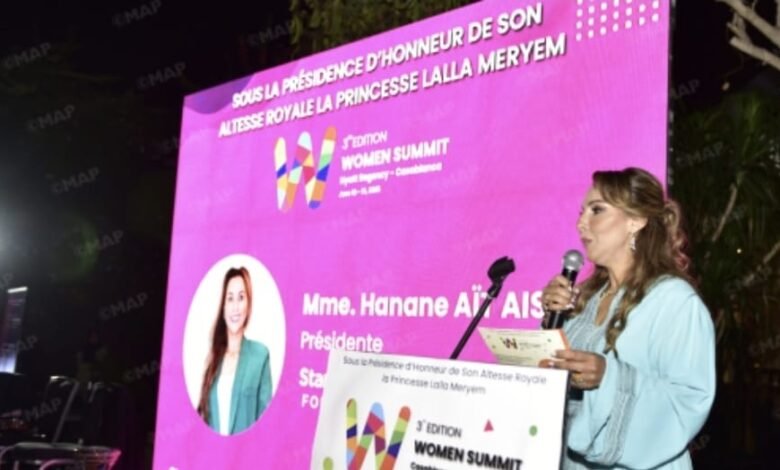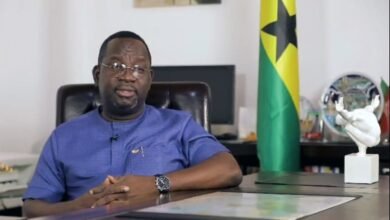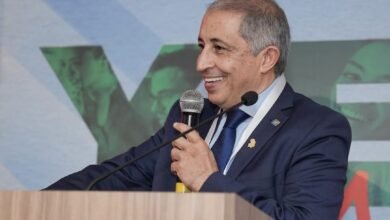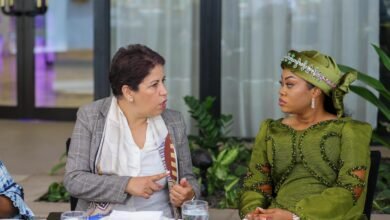Gender Leadership in Africa: “Women Are the Agents of Progress” — Hanane Aït Aïssa, President of GWS25

By Karima Rhanem, Senior Managing Editor
As Africa grapples with unprecedented transformation across social, economic, and environmental fronts, women are increasingly being recognized as central to shaping the continent’s future. Hanane Aït Aïssa, President of Women Growth and founder of the Growth Women Summit (GWS), believes that sustainable progress cannot happen without women leading innovation and equity initiatives at all levels.
In this exclusive interview with The New Africa Magazine, she shares why the summit’s 2025 edition carries both symbolic and strategic weight, how regional hackathons are sparking grassroots impact, and what long-term vision she holds for empowering African women to drive systemic change.
What inspired this year’s theme — “A New World, New Challenges for Africa: Women as Drivers of Innovation, Equity, and Sustainability” — and why is it timely now?
This year’s theme reflects an undeniable reality: Africa is at a major turning point. Amid economic transformations, social challenges, and environmental concerns, we are facing a “new world” that requires inclusive and innovative responses. Women — as leaders, entrepreneurs, and changemakers — are at the heart of this transformation. They are drivers of innovation and key to building a more equitable and sustainable Africa.
The post-COVID era has also reinforced the importance of sustainability across all sectors. This compels us to rethink models of education, healthcare, and economic development — and ensure women are at the center of these new paradigms.

This is the third edition of the Growth Women Summit. What has changed or evolved since the first? And in what ways does the summit serve as more than a gathering — perhaps as a movement or a platform for long-term impact?
Since its first edition, the Women Summit has grown significantly, bringing together a growing number of participants from diverse backgrounds — entrepreneurs, decision-makers, activists, and young leaders. More than just an event, it has become a platform for dialogue, exchange, and above all, action.
The summit has given rise to tangible initiatives such as regional hackathons and the Ubuntu Awards, which help sustain long-term impact and nurture an engaged community. In 2025, strategic agreements will be signed with key institutions to promote women’s empowerment — initiatives that will be unveiled during the two days of the summit.
What are some of the structural barriers that continue to hinder women’s full participation in innovation and entrepreneurship — and how is GWS25 addressing them?
Several barriers persist: limited access to finance, restrictive cultural norms, lack of professional networks, and inequities in education and training. GWS25 works on multiple fronts to tackle these issues. On one hand, it fosters networking between women leaders and institutional partners. On the other, it promotes targeted training initiatives, particularly through regional hackathons.
By recognizing and openly discussing these challenges during the summit, we aim to raise awareness and emphasize the urgency of incorporating gender equity as a key component of public policies and private initiatives alike.
How does the summit balance grassroots voices with high-level leadership? How important is that mix for meaningful dialogue?
The Women Summit is a unique space where grassroots actors with hands-on experience meet high-level political and economic leaders. This intergenerational and cross-sectoral dialogue is essential to crafting realistic and actionable solutions.
Community voices help identify real needs and everyday obstacles, while decision-makers can commit to addressing them at policy and strategic levels. The result is a grounded and inclusive conversation that paves the way for more effective policies and partnerships.
Moreover, the fact that the Women Summit is held under the honorary presidency of Her Royal Highness Princess Lalla Meryem is a strong symbol of high-level commitment to advancing gender equality in Africa.
You’re hosting regional hackathons leading up to the summit in Casablanca. What role do these local initiatives play in the broader vision of GWS25?
The regional hackathons serve as an innovative mechanism to identify and support young women leaders early on, especially at the school and university levels. These local events help raise awareness about leadership, promote creative problem-solving, and channel grassroots energy into scalable ideas.
They also ensure that the summit is rooted in local realities, reinforcing the link between national strategies and local talent. In doing so, they lay the groundwork for a new generation of African women changemakers.
What are some of the key themes or challenges that you expect to emerge most strongly from the workshops and panels this year?
This year, several major themes are expected to dominate discussions: access to funding for women entrepreneurs, the role of women in sustainable development, digital inclusion, youth leadership, and mental health. The panels will also explore public-private collaboration, climate justice, and how to integrate women more fully in governance and decision-making spaces.
These themes are approached from both a policy and grassroots perspective, enabling the emergence of actionable, locally grounded recommendations.
The summit brings together women leaders not just from Africa, but also from the diaspora and international institutions. What kind of partnerships are you hoping to forge through this summit?
The Women Summit is designed as a catalyst for collaboration between Africa, its diaspora, and international institutions. We aim to build strategic partnerships around three pillars: capacity building, access to resources, and knowledge sharing.
We hope to facilitate the creation of joint programs, tailored financing mechanisms for women entrepreneurs, and cross-continental mentorship initiatives. The summit provides fertile ground for building long-term alliances that will last well beyond the event.
Beyond inspiration, GWS25 aims to deliver a digital white paper and a concrete roadmap. Can you share more about what that process will look like, and how it will be used afterward?
The Women Summit is not just about inspiration — it’s about action. Following the panels and workshops, we will compile a digital white paper featuring key insights, recommendations, and best practices. This will be paired with a concrete roadmap, co-created with partners, to guide future initiatives.
In addition, a Casablanca Declaration will be presented — a collective statement of commitment that highlights structural barriers and offers actionable levers for change. These tools will serve as key advocacy instruments with public decision-makers, donors, and private actors to integrate gender and innovation at the heart of development policies.
How do you envision the Growth Women community growing after the summit? Are there plans for continued engagement, mentoring, or advocacy campaigns?
The Growth Women community — which has existed since 2019 — is already a thriving pan-African network. It has supported over 2,000 women entrepreneurs and cooperatives, and enabled the financing of more than 600 businesses across several Moroccan regions, including the Oriental, Souss Massa, Drâa-Tafilalet, Fès-Meknès, and more, often in collaboration with government programs like the INDH (National Initiative for Human Development).
The community also actively promotes grassroots ecosystems, such as rural cooperatives in Azilal and urban cooperatives in the Aïn Sebaâ – Hay Mohammadi district, placing local women entrepreneurs at the forefront.
Following GWS25, we will expand the Growth Women platform to include new mentorship, training, and visibility programs, in collaboration with partners such as APEFE (Belgian cooperation program), Veolia, and others. Our goal is to create a vibrant and evolving space where women leaders can learn, connect, and amplify their voices — together.
If you could leave participants — and the continent — with one lasting message from this summit, what would it be?
As His Majesty King Mohammed VI powerfully stated:
“Africa’s development depends on the full participation of its women. They are the backbone of our societies, the guarantors of stability, and the agents of progress.”
This royal vision captures the essence of our message.
Africa cannot rise to its full potential without women. They are already at the origin of countless — often invisible — solutions. It is time to give them the space and recognition they deserve: in governance, in innovation, in the economy, and across our territories.
The Women Summit is a call to collective action, driven by ambition and conviction, for a more just, inclusive, and forward-looking Africa. It is also a call to acknowledge, support, and invest in women as essential agents of transformation.





